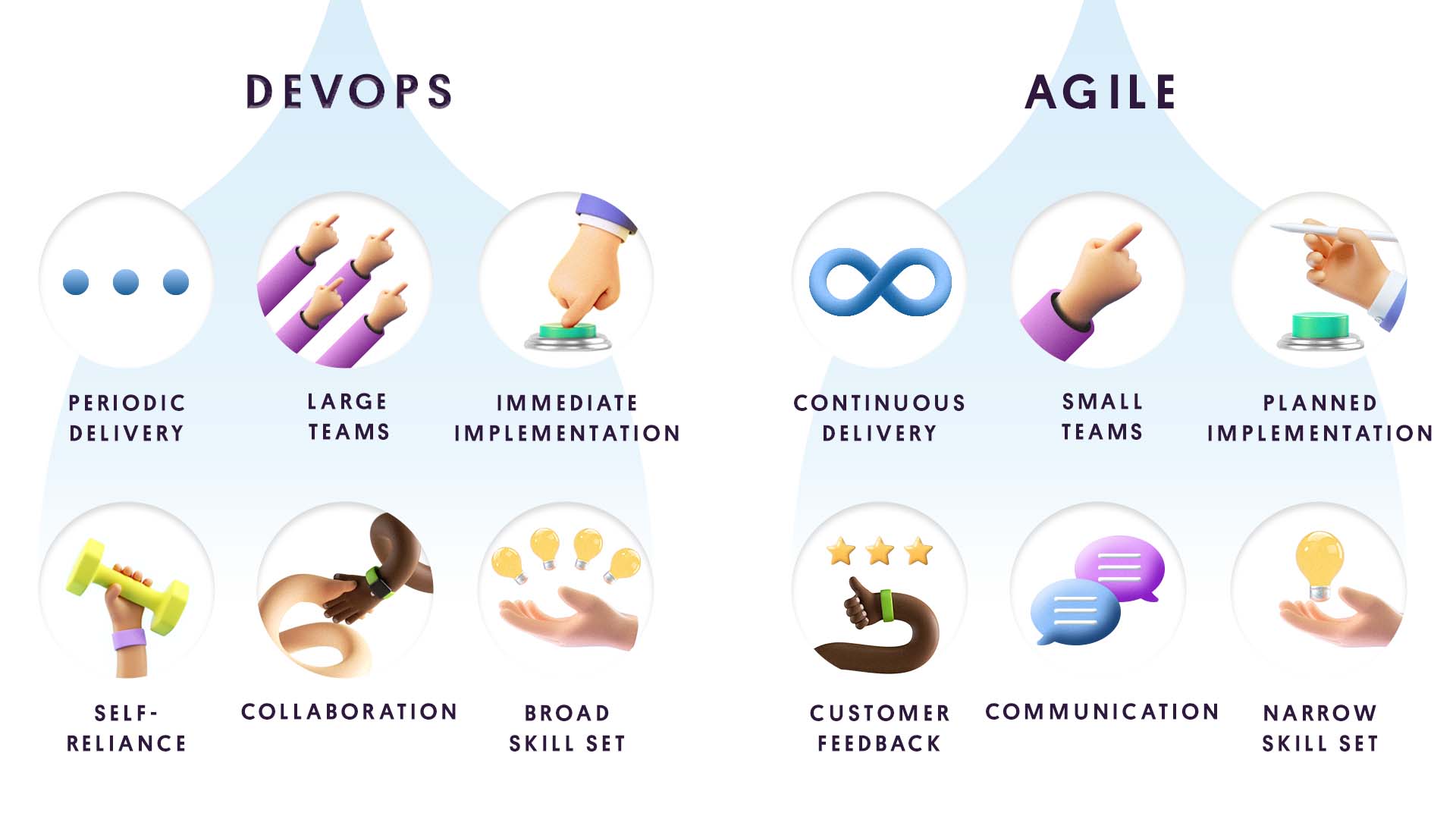
Agile vs. DevOps Methodologies

How does Agile work in DevOps?
Where DevOps is cross-functional, Agile focuses only on developer workflows, with a “fail fast and recover” approach to development. This is achieved through short, incremental development cycles called sprints, where different teams work on specific aspects of a project before integrating everything for testing.
What is an Agile Methodology?
Agile software development refers to software development methodologies with a focus on iterative development. Agile’s main objective is to deliver high-quality software quickly and efficiently. It’s based on iterative and incremental development, where requirements and solutions evolve through collaboration between cross-functional teams. Agile is structured on four key principles: individuals and interactions over processes and tools; working software over comprehensive documentation; customer collaboration over contract negotiation; and responding to change over following a plan. These principles are meant to encourage Agile teams to be flexible and adaptable so that they can respond quickly to changes and deliver the best possible software.
The agile methodology is a direct successor to the waterfall approach, aiming to streamline software development through innovative and collaborative practices and helping teams respond to the unpredictability of software development. The Agile approach advocates for adaptive planning, evolutionary development, early delivery, and continuous improvement, and encourages rapid, flexible response to change.
Core components of Agile:
- An iterative approach focused on collaboration, customer feedback, and small, rapid releases
- Agile helps to manage complex projects
- Agile focuses on constant changes
- Agile methods can be implemented within a range of technical frameworks like SAFe or Scrum
- Agile trains all team members to develop a wide variety of skills at a similar or equal level
- Small teams are the core of Agile
- In Agile, feedback is given by the customer
- Agile emphasizes software development: The process ends at the development stage with no focus on operations
- Agile addresses the gap between customer needs and development testing teams
- Agile focuses on functional and non-functional readiness
What is DevOps?
DevOps is a culture, movement, or practice that emphasizes collaboration and communication between software developers and other IT professionals while automating software delivery and infrastructure changes. DevOps has much wider applications than solely software development, encompassing every stage of the software lifecycle including design, development, deployment, and production support. DevOps aims to establish a culture and environment where building, testing, and releasing software happens rapidly, frequently, and reliably. The term “DevOps” was first coined by Patrick Debois, who proposed it seeking to bridge the gap between Developers and Operations.
Core components of DevOps:
- Considered a practice of bringing development and operations teams together
- The central concept is to manage end-to-end engineering processes
- Focuses on constant testing and delivery
- Focuses on collaboration (no commonly accepted framework)
- DevOps removes siloes between development and operations teams
- Larger team size as it involves all stakeholders
- Feedback comes from the internal team
- Emphasizes the development, operation, or monitoring process. It takes ready-to-release software and deploys it in a reliable, secure manner
- Addresses the gap between development, testing, and operations
- Focuses on operational and business readiness

Similarities between DevOps and Agile
Both DevOps and Agile emphasize collaboration and communication between teams, and both emphasize the importance of automating repetitive tasks. In addition, both frameworks place a strong emphasis on delivering high-quality software products quickly and efficiently. However, there are also some key differences between Agile and DevOps. Agile focuses on delivering software in short cycles, while DevOps emphasizes continuous delivery. Agile tends to be more focused on individual developers, while DevOps takes a more holistic approach that includes everyone involved in the software development process. Despite these differences, both Agile and DevOps share a common goal: Helping teams work together more effectively to deliver high-quality software.
The main similarity between Agile methodology and DevOps is that they are both designed to speed up development by making it more efficient. Both emphasize communication and collaboration between Development and Operations teams. Moreover, they both seek to optimize existing processes through automation where possible. Finally, both are iterative approaches that emphasize constant feedback in order to make improvements.
To summarize:
- Both focus on automation of software development, reducing dev timelines
- Both are designed to respond to uncertainty by adopting a flexible and accountable methodology
- Both function through a mechanism of continuous feedback, self-tuning, and adjustments across the software dev lifecycle
Differences between Agile and DevOps
There are a number of key differences between Agile and DevOps. Perhaps the most significant difference is that DevOps is more focused on automation and continuous delivery, whereas Agile is more focused on collaboration and iterative development. This means that DevOps teams are typically more heavily reliant on technology, whereas Agile teams place more emphasis on people and processes. Another key difference is that DevOps teams tend to be more cross-functional, while Agile teams are typically more siloed. This difference in approach can lead to different challenges; for example, DevOps teams may struggle with maintaining control over their processes, while Agile teams may find it difficult to effectively communicate and collaborate. Ultimately, the best way to determine which approach is best for your organization will depend on your specific needs and goals.
To summarize:
- Agile focuses on dev, testing, and deployment, while DevOps expands the scope to focus equally on the operation portion (continuous monitoring)
- Agile is oriented towards lean development, reducing wastage of resources (i.e. idle time), while DevOps relies on predictive measures to ensure cost-cutting through reduction of overall time to market
Additional DevOps resources

Understand source code management
Source code management (SCM) helps teams work quickly and collaborate efficiently. Learn all you need to know about version control tools, when to use them, and how they work.

CI/CD explained
Implementing DevOps practices can streamline your development pipeline and make your team and users happier. Learn more about how DevOps can help you.

The benefits of DevOps
Implementing DevOps practices can streamline your development pipeline and make your team and users happier. Learn more about how DevOps can help you.
DevOps e-books & case studies

Four essential DevOps practices
Learn the fundamental principles of the DevOps methodology for game development, and hear from studios who have found success with Unity’s portfolio of solutions.

Version control best practices
In this e-book, get insights from the Unity Version Control team on how to become a better software developer and master version control by implementing the perfect workflow.

KO_OP accelerates production and reduces chaos
How does a worker-owned cooperative studio get artists and engineers aligned on production? Read how KO_OP implemented Unity Version Control as part of their DevOps methodology.

Work distributed and centralized with Unity's DevOps solutions. Manage big binary files easily with file and change set-based workflows.